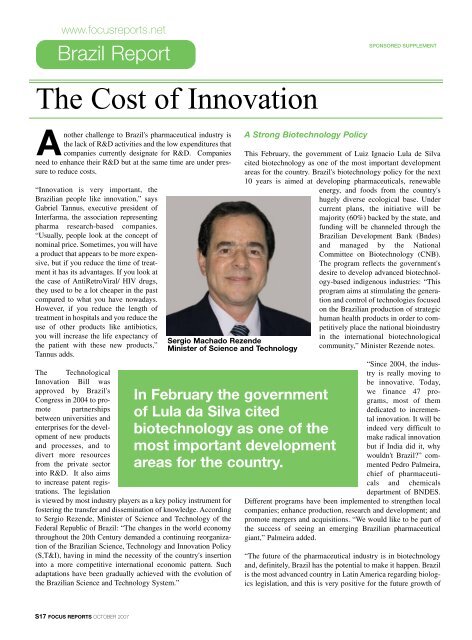When Girls Take the Lead - Pharmaceutical Executive
When Girls Take the Lead - Pharmaceutical Executive
When Girls Take the Lead - Pharmaceutical Executive
You also want an ePaper? Increase the reach of your titles
YUMPU automatically turns print PDFs into web optimized ePapers that Google loves.
www.focusreports.net<br />
Brazil Report<br />
The Cost of Innovation<br />
Ano<strong>the</strong>r challenge to Brazil's pharmaceutical industry is<br />
<strong>the</strong> lack of R&D activities and <strong>the</strong> low expenditures that<br />
companies currently designate for R&D. Companies<br />
need to enhance <strong>the</strong>ir R&D but at <strong>the</strong> same time are under pressure<br />
to reduce costs.<br />
“Innovation is very important, <strong>the</strong><br />
Brazilian people like innovation,” says<br />
Gabriel Tannus, executive president of<br />
Interfarma, <strong>the</strong> association representing<br />
pharma research-based companies.<br />
“Usually, people look at <strong>the</strong> concept of<br />
nominal price. Sometimes, you will have<br />
a product that appears to be more expensive,<br />
but if you reduce <strong>the</strong> time of treatment<br />
it has its advantages. If you look at<br />
<strong>the</strong> case of AntiRetroViral/ HIV drugs,<br />
<strong>the</strong>y used to be a lot cheaper in <strong>the</strong> past<br />
compared to what you have nowadays.<br />
However, if you reduce <strong>the</strong> length of<br />
treatment in hospitals and you reduce <strong>the</strong><br />
use of o<strong>the</strong>r products like antibiotics,<br />
you will increase <strong>the</strong> life expectancy of<br />
<strong>the</strong> patient with <strong>the</strong>se new products,”<br />
Tannus adds.<br />
The Technological<br />
Innovation Bill was<br />
approved by Brazil's<br />
Congress in 2004 to promote<br />
partnerships<br />
between universities and<br />
enterprises for <strong>the</strong> development<br />
of new products<br />
and processes, and to<br />
divert more resources<br />
from <strong>the</strong> private sector<br />
into R&D. It also aims<br />
to increase patent registrations.<br />
The legislation<br />
is viewed by most industry players as a key policy instrument for<br />
fostering <strong>the</strong> transfer and dissemination of knowledge. According<br />
to Sergio Rezende, Minister of Science and Technology of <strong>the</strong><br />
Federal Republic of Brazil: “The changes in <strong>the</strong> world economy<br />
throughout <strong>the</strong> 20th Century demanded a continuing reorganization<br />
of <strong>the</strong> Brazilian Science, Technology and Innovation Policy<br />
(S,T&I), having in mind <strong>the</strong> necessity of <strong>the</strong> country's insertion<br />
into a more competitive international economic pattern. Such<br />
adaptations have been gradually achieved with <strong>the</strong> evolution of<br />
<strong>the</strong> Brazilian Science and Technology System.”<br />
S17 FOCUS REPORTS OCTOBER 2007<br />
Sergio Machado Rezende<br />
Minister of Science and Technology<br />
A Strong Biotechnology Policy<br />
In February <strong>the</strong> government<br />
of Lula da Silva cited<br />
biotechnology as one of <strong>the</strong><br />
most important development<br />
areas for <strong>the</strong> country.<br />
SPONSORED SUPPLEMENT<br />
This February, <strong>the</strong> government of Luiz Ignacio Lula de Silva<br />
cited biotechnology as one of <strong>the</strong> most important development<br />
areas for <strong>the</strong> country. Brazil's biotechnology policy for <strong>the</strong> next<br />
10 years is aimed at developing pharmaceuticals, renewable<br />
energy, and foods from <strong>the</strong> country's<br />
hugely diverse ecological base. Under<br />
current plans, <strong>the</strong> initiative will be<br />
majority (60%) backed by <strong>the</strong> state, and<br />
funding will be channeled through <strong>the</strong><br />
Brazilian Development Bank (Bndes)<br />
and managed by <strong>the</strong> National<br />
Committee on Biotechnology (CNB).<br />
The program reflects <strong>the</strong> government's<br />
desire to develop advanced biotechnology-based<br />
indigenous industries: “This<br />
program aims at stimulating <strong>the</strong> generation<br />
and control of technologies focused<br />
on <strong>the</strong> Brazilian production of strategic<br />
human health products in order to competitively<br />
place <strong>the</strong> national bioindustry<br />
in <strong>the</strong> international biotechnological<br />
community,” Minister Rezende notes.<br />
“Since 2004, <strong>the</strong> industry<br />
is really moving to<br />
be innovative. Today,<br />
we finance 47 programs,<br />
most of <strong>the</strong>m<br />
dedicated to incremental<br />
innovation. It will be<br />
indeed very difficult to<br />
make radical innovation<br />
but if India did it, why<br />
wouldn't Brazil?” commented<br />
Pedro Palmeira,<br />
chief of pharmaceuticals<br />
and chemicals<br />
department of BNDES.<br />
Different programs have been implemented to streng<strong>the</strong>n local<br />
companies; enhance production, research and development; and<br />
promote mergers and acquisitions. “We would like to be part of<br />
<strong>the</strong> success of seeing an emerging Brazilian pharmaceutical<br />
giant,” Palmeira added.<br />
“The future of <strong>the</strong> pharmaceutical industry is in biotechnology<br />
and, definitely, Brazil has <strong>the</strong> potential to make it happen. Brazil<br />
is <strong>the</strong> most advanced country in Latin America regarding biologics<br />
legislation, and this is very positive for <strong>the</strong> future growth of






